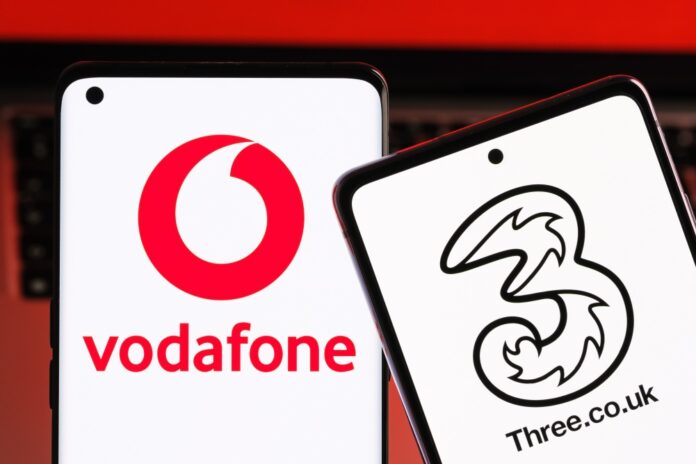As expected, the competition watchdog is to extend its investigation into the merger that would reduce the number of mobile providers in the UK to three
The UK Competition and Markets Authority (CMA) has decided to refer the proposed merger of Vodafone UK and Three UK to a Phase 2 review. The CMA launched the Phase 1 investigation in January after it was notified by Vodafone UK and Three UK.
This 40 working day review was to identify whether the deal could lead to a ‘substantial lessening of competition’. Phase 2 investigations allow an independent panel of experts to probe in more depth initial concerns identified at Phase 1.
Phase 2 investigations last 24 weeks but this can be extendable by up to eight weeks in certain circumstances.
The CMA is concerned the deal, which would combine two of the four mobile network operators in the UK, could lead to mobile customers facing higher prices and reduced quality.
Kester Mann, Director, Consumer and Connectivity, CCS Insight, said, “Vodafone-Three is poised on a regulatory knife-edge”, adding, “but if both parties are eventually willing to make further concessions – such as divesting assets like mobile spectrum – they should just about get it over the line.”
Remaining confident
Vodafone UK and Three UK responded saying this “was an expected next step in the process and in line with the timeframe for completion that we set out from the outset” and they “remain confident that the transaction will deliver significant benefits for competition, customers and the country”.
The two operators confirmed they were in merger negotiations in October 2022 and had hammered out a binding deal by summer 2023.
Their rationale for the merger is that due to the structure of the UK market, they cannot compete with EE and Virgin Media O2 because their networks are sub-scale and they are unable to cover their cost of capital.
The ‘structure of the UK market’ is treated in the two parties’ narrative like something imposed on the sector by outside forces rather than a series of investment and business decisions by the operators in question.
Vodafone and Three UK argue a third, properly funded and scaled network is a better option for UK consumers and companies, “thanks to a step-change in network quality, speed, and coverage”. A combined network would also boost competition in the wholesale market by offering greater choice to MVNOs.
Extensive research by Strand Consult might well support their case, using empirical evidence from around the world on the effect on reducing the number of operators from four to three in markets, rather than idealogy.
The UK pair also insist that the merger would be a better deal for consumers and companies “from Day 1” although it is hard to see how as benefits from mergers are never instant and usually substantially less than envisaged.
Yesterday Three UK used its first loss since 2010 to underline the necessity of the merger.
Phase 2 all but guaranteed
James Robinson, Senior Analyst at Assembly, noted, “This deal [was] all but guaranteed to trigger a Phase 2 review. The CMA didn’t clear BT’s acquisition of EE in 2016 in Phase 1 – and that was a far less controversial transaction that didn’t remove a competitor from the market.
He added, “The parties would have had to offer up something significant to secure approval at this stage, which would have been ambitious with such a short timeline to work with.
“We expect the CMA’s assessment so far to have focused on spectrum holdings, network sharing, MVNO access and retail prices. Some of these issues will be easier to address than others. We don’t expect to see appetite for a carve-out of infrastructure to facilitate a new entrant. Such a remedy, while used elsewhere (including recently in Spain), would undermine the rationale for the merger in the first place.”
A knife-edge
Mann predicts the Phase 2 investigation, “will see the competition watchdog scrutinise every aspect of the deal, including its potential impact on customer choice, innovation, pricing and service quality.
“One of the CMA’s biggest concerns will be the threat of higher prices. In the coming days, Vodafone and Three plan to raise the cost of many contracts by 7.9%, an ill-timed move that may not sit well with the Competition Watchdog.”
Contentious issues
Robinson adds, “A combined holding of around 50% of total spectrum, and notably a high degree of capacity, makes this one of the most contentious issues of a merged Three/Vodafone. Based on our analysis, in five out of six similar transactions offering spectrum divestment was necessary to get the deal through.
“It seems entirely plausible that a set of commitments, for example divesting spectrum and/or exiting network sharing agreements, could be agreed during the next phase that would be acceptable to the CMA and see the deal approved.”
“My view remains that the deal should be approved. It is better to have three strong providers than two that are dominant and two that are sub-scale. Blocking it could thwart the long-term development of the UK’s telecom infrastructure,” concludes Mann.


